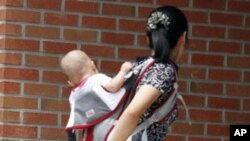South Korea will soon begin construction of a new resettlement facility for North Korean defectors. The number of refugees reaching the south has skyrocketed in recent years and the Seoul has pledged to help them adjust to life in the free world. But many difficulties still remain for North Koreans as they try to start new lives in a country they know little about.
Anticipation
No ground was actually broken at this ground breaking ceremony. But there were plenty of fireworks.
South Korea’s Ministry of Unification, the government body tasked with overseeing relations with North Korea, commenced construction on Thursday of a residence facility for newly arrived North Korean defectors.
There is already one such resettlement compound, known as Hanawon, south of Seoul where all refugees stay for three months. There, they learn how to use things like bank machines and computers, study the South Korean way of speaking and pick up skills that will help them find jobs when they are released.
Speaking at the ceremony, Unification Minister Hyun In Taek says it is his nation’s responsibility to help these defectors. He says North Koreans should receive the same opportunities as South Koreans.
Hanawon is a symbol of South Korea’s desire to ensure that the increasing number of defectors lead comfortable and happy lives.
New arrivals
The South Korean government says there now are just under 22,000 defectors, over half of whom have arrived in just the past three years.
Most come via China, where networks of Christian missionaries and human traffickers bring North Koreans to Southeast Asia before flying to Seoul.
China routinely arrests North Koreans and deports them back to their home. Human rights activists say, if repatriated, escapees are tortured or even executed.
Assimilation
But even though their lives may no longer be at risk in South Korea, many still find it hard to fit in. Some are traumatized by their experiences fleeing their homeland.
That is why Lee Duk-haeng, a Hanawon deputy commissioner, says the Ministry of Unification needs to provide psychological support.
Lee says there are five counselors who help North Koreans cope with any trauma they have suffered. In one year, they see about 10,000 cases.
The new resettlement facility is scheduled for completion by the end of 2012. But it might not be ready soon enough to deal with the all of the new arrivals. The Ministry of Unification says that by the end of this year, they expect another 2,000 defectors to reach South Korea.






